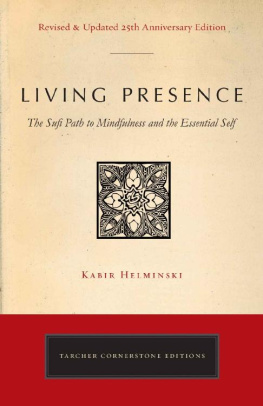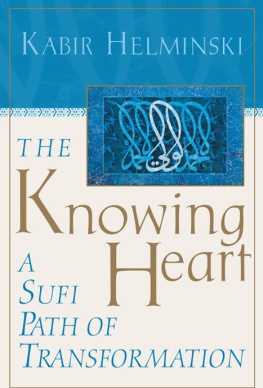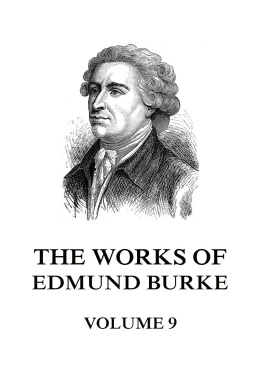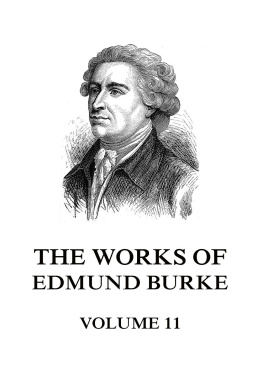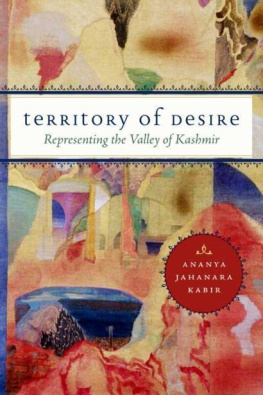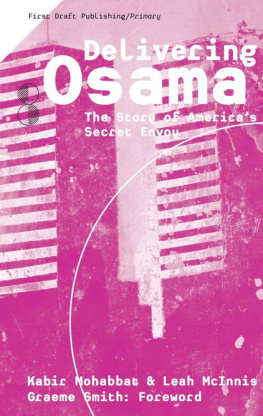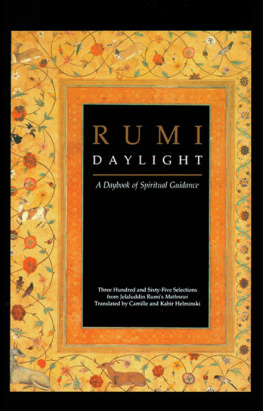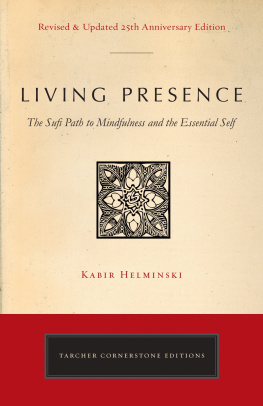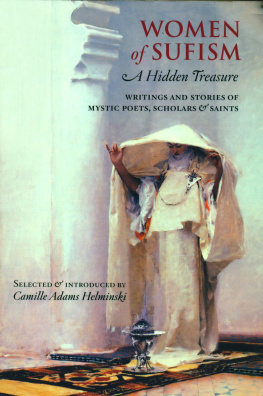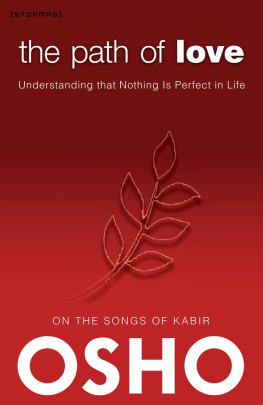Kabir Edmund Helminski - Living Presence (Revised)
Here you can read online Kabir Edmund Helminski - Living Presence (Revised) full text of the book (entire story) in english for free. Download pdf and epub, get meaning, cover and reviews about this ebook. year: 2017, publisher: Penguin Publishing Group, genre: Religion. Description of the work, (preface) as well as reviews are available. Best literature library LitArk.com created for fans of good reading and offers a wide selection of genres:
Romance novel
Science fiction
Adventure
Detective
Science
History
Home and family
Prose
Art
Politics
Computer
Non-fiction
Religion
Business
Children
Humor
Choose a favorite category and find really read worthwhile books. Enjoy immersion in the world of imagination, feel the emotions of the characters or learn something new for yourself, make an fascinating discovery.
- Book:Living Presence (Revised)
- Author:
- Publisher:Penguin Publishing Group
- Genre:
- Year:2017
- Rating:3 / 5
- Favourites:Add to favourites
- Your mark:
- 60
- 1
- 2
- 3
- 4
- 5
Living Presence (Revised): summary, description and annotation
We offer to read an annotation, description, summary or preface (depends on what the author of the book "Living Presence (Revised)" wrote himself). If you haven't found the necessary information about the book — write in the comments, we will try to find it.
Living Presence (Revised) — read online for free the complete book (whole text) full work
Below is the text of the book, divided by pages. System saving the place of the last page read, allows you to conveniently read the book "Living Presence (Revised)" online for free, without having to search again every time where you left off. Put a bookmark, and you can go to the page where you finished reading at any time.
Font size:
Interval:
Bookmark:


An imprint of Penguin Random House LLC
375 Hudson Street
New York, New York 10014
First published by Jeremy P. Tarcher/Putnam 1992
This revised edition published by TarcherPerigee 2017
Copyright 1992, 2017 by Kabir Edmund Helminski
Penguin supports copyright. Copyright fuels creativity, encourages diverse voices, promotes free speech, and creates a vibrant culture. Thank you for buying an authorized edition of this book and for complying with copyright laws by not reproducing, scanning, or distributing any part of it in any form without permission. You are supporting writers and allowing Penguin to continue to publish books for every reader.
Tarcher and Perigee are registered trademarks, and the colophon is a trademark of Penguin Random House LLC.
Library of Congress Cataloging-in-Publication Data
Names: Helminski, Kabir Edmund, 1947-, author.
Title: Living presence (revised) : the Sufi path to mindfulness and the essential self / Kabir Edmund Helminski.
Description: New York : TarcherPerigee, 2017.
Identifiers: LCCN 2016055532 (print) | LCCN 2016056608 (ebook) | ISBN 9780143130130 (paperback) | ISBN 9781101993590
Subjects: LCSH: SufismPrayers and devotions. | Sufism. | BISAC: BODY, MIND & SPIRIT / Spiritualism. | BODY, MIND & SPIRIT / Meditation. | RELIGION / Islam / Sufi.
Classification: LCC BP189.62 .H45 2017 (print) | LCC BP189.62 (ebook) | DDC 297.4/4dc23
LC record available at https://lccn.loc.gov/2016055532
Cover design: Nita Ybarra
Version_1
T HE PRACTICE OF PRESENCE invites us to a conscious relationship with God. Faith, righteous action, ethics, and social justice are all founded upon a state in which the human being remembers God. Yet, the capacity to remember God is related to the ability to be awake, to be here. To act with intention (niyah), with reflection (tafakkur), with self-vigilance (taqwa), and with beneficence (ihsan) presumes a state of conscious presence.
This theme runs through all the great spiritual traditions. It goes by many namesawakening, recollection, mindfulness, remembering, zhikrand by no name at all. This awakened state of consciousness opens us to awe and wonder. It adds further dimensions to being in this world. Beyond that narrow band of awareness that has come to be accepted as the conventional state of consciousness is a faculty that is the master key to unlocking our latent human potential.
We find this state in all traditions wherever we find true reverence, an awareness of the sacred, but in Islam all of life is made sacred. So many of the practices of Islam can be understood as ways requiring and developing presence: performing ablutions (wudu), offering the ritual prayer (salaah), the courtesy (adab) of our relationships. For the purposes of our reflections we shall call it presence.
Presence signifies the quality of consciously being here. It is the activation of a higher level of awareness that allows all our other human functionssuch as thought, feeling, and actionto be known, developed, and harmonized. Presence is the way in which we occupy space, as well as how we flow and move. It shapes our self-image and emotional tone. It determines the degree of our alertness, openness, and warmth. Presence decides whether we leak and scatter our energy or embody and direct it.
Presence is the human self-awareness that is the end result of the evolution of life on this planet. Human presence is not merely quantitatively different from other forms of life; humanity represents a new form of life, of concentrated spiritual energy sufficient to produce will. With will, the power of conscious choice, human beings can formulate intentions, transcend their instincts and desires, educate themselves, and steward the natural world. Unfortunately, humans can also use this power to exploit nature and tyrannize other human beings. This potency of will, which on the one hand can connect us to conscious harmony, can also lead us in the direction of separation from that same harmony.
I HAVE BEEN SPEAKING OF PRESENCE as a human attribute, with the understanding that it is the presence of God reflected through the human being. We can learn to activate this presence at will. Once activated, it can be found both within and without. Because we find it extending beyond the boundaries of what we thought was ourselves, we are freed from separation, from duality. We could then speak of being in this presence.
Many people today live in a pluralist, postmodern, post-religious age. Fewer people have the security of faith (iman). We live at a time when the stories, belief systems, and mythologies of past centuries have lost their credibility and yet are more available to all of us than ever before in human history. We see them as relative truths now, not absolutes. The margins of cultures have become porous; parochialism is dissolving, but we do not yet have a shared spiritual vocabulary. Yet the world is moving toward an unprecedented economic, psychological, and spiritual convergence. We are so many people, sharing a limited space. Communication is becoming universal and instantaneous. Humankind needs a spiritual awareness more than ever to balance this explosion of technology and communication. We need a feeling for the nobility and responsibility of being human, as we need an awareness of the unity of all life, or we will succumb to unconscious forces that will drag us down. Perhaps more than ever before, we need a way to activate and develop our latent humanness to balance the forces that challenge itthe unprecedented means of satisfying our desires and the prevailing ignorance about the meaning and purpose of life.
But we neednt be pessimistic. Sufism, by which I mean the inner, essential understanding of Islam as a spiritual training system, is an expression of the Creative Power at the heart of life and can guide us through these challenging times.
I WOULD LIKE TO SHARE in the most practical way some of the experiences, reflections, and knowledge that have been preserved within the traditional wisdom of Islam. It is time that these ideas entered into the very hearts of contemporary human beings. Presented in a new language, they may pass through the walls of resistance and conditioning that modern circumstances have erected.
I owe much to the living teachers who have generously shared their knowledge and their presence. I refer to various teachers as my teacher in this book because I wish to stress their functional role rather than their biographical identity.
Different people within the broad tradition of love and presence have given me what I could receive and what they could give. Without this living connection, I would not have begun to grasp the teachings left by the tradition. What I owe to the spiritual history of Islam is implicit in all that I will have to say here.
Much of my adult life has been occupied with an inquiry into various spiritual psychologies and practices. I have traveled the path, and I have explored some side roads and even some dead ends. For more than forty years I have been involved in an experiment of applying the traditional wisdom of the East and Middle East in a contemporary Western environment. My own experience has proven to me that the practice of presence is an essential means to live a fully human life here and now and to know those qualities that are described as spiritual.
Font size:
Interval:
Bookmark:
Similar books «Living Presence (Revised)»
Look at similar books to Living Presence (Revised). We have selected literature similar in name and meaning in the hope of providing readers with more options to find new, interesting, not yet read works.
Discussion, reviews of the book Living Presence (Revised) and just readers' own opinions. Leave your comments, write what you think about the work, its meaning or the main characters. Specify what exactly you liked and what you didn't like, and why you think so.

